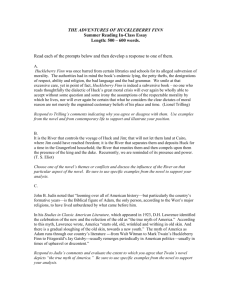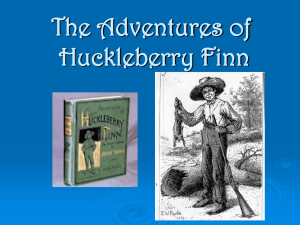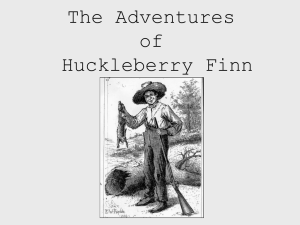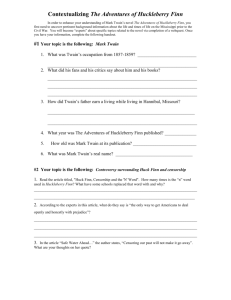Huckleberry Finn, a Child of the Nineteenth Century
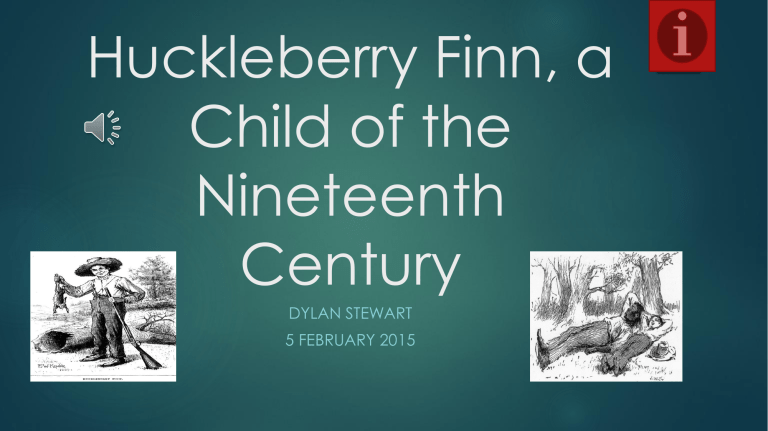
Huckleberry Finn, a
Child of the
Nineteenth
Century
DYLAN STEWART
5 FEBRUARY 2015
Table of Contents
Slide 5 – The Significance of the Text
Slide 6 – Controversy Surrounding the Text
Slide 7 – Important Characters
Slide 10 – Additional Information
Mark Twain
Samuel Langhorne Clemens (November 30, 1835 – April 21, 1910), better known by his pen name Mark Twain, was an American author and humorist from Hannibal, Missouri, which provided the setting for
Huckleberry Finn and Tom Sawyer.
Twain's works have been subjected to censorship efforts due to many people viewing his works as highly racist, although upon further study of his texts, this assumption does not seem accurate.
Twain was born shortly after a visit by Halley's Comet, and he predicted that he would "go out with it" too. His prediction was correct, and he died the day following the comet's subsequent return. He was lauded as the "greatest American humorist of his age" and William Faulkner called Twain "the father of American literature.“
Significance of Huckleberry Finn
The text is among the first in major American literature to be written entirely in vernacular English, characterized by local color regionalism.
Set during the period before the Civil War along the Mississippi River,
Huckleberry Finn is an often scathing satire on entrenched attitudes of the time period, particularly racism.
The text was one of the first novels in the genre of realism published in the late-nineteenth century, which signified a transition from romanticism to realism.
The novel may initially seem to be purposely offensive, but it actually serves as a tool to promote equality by challenging the traditional notions of equality and by tracing its central character's moral development throughout the novel.
Controversy
The language that Twain uses in Adventures of Huckleberry Finn made for its controversial condition during its first year on the shelves and into the modern world of literature.
Because of the controversy over whether Huckleberry Finn is racist or anti-racist, and because the word "nigger" is frequently used in the novel, many have questioned the appropriateness of teaching the book in the U.S. public school system.
In an effort to make the text less offensive, a new edition of the book was published by NewSouth Books in 2011. This edition replaced the word "nigger" with "slave" (although being incorrectly addressed to a freed man) and did not use the term "Injun“ to refer to Native
Americans.
Important Characters
Huck Finn - is a boy about thirteen or fourteen years old. He has been raised by his father, the town drunk, and has a hard time fitting into society.
Widow Douglas - has taken Huck in after he helped save her from a violent home invasion. She tries her best to civilize Huck, believing it is her Christian duty.
Miss Watson - is the widow's sister. She is fairly hard on Huck, causing him to resent her a good deal.
Jim - is Miss Watson's big, mild-mannered slave to whom Huck becomes very close in the novel. Jim eventually flees Miss Watson to seek refuge from slavery, and Huck and Jim become fellow travelers on the Mississippi River.
Tom Sawyer - is Huck's best friend and the main character of other Twain novels.
He is also the leader of the town boys in adventures.
Pap Finn - is Huck's father and the town drunk. He is often angry at Huck and resents him getting any kind of education. He also returns to Huck whenever he needs more money for alcohol.
Quotes
“Now she had got a start, and she went on and told me all about the good place. She said all a body would have to do there was to go around all day long with a harp and sing, forever and ever. So I didn't think much of it. But I never said so. I asked her if she reckoned Tom Sawyer would go there, and she said not by a considerable sight. I was glad about that, because I wanted him and me to be together” (Huck, Chapter1).
“After supper she got out her book and learned me about Moses and the
Bulrushers, and I was in a sweat to find out all about him; but by and by she let it out that Moses had been dead a considerable long time; so then I didn't care no more about him, because I don't take no stock in dead people” (Huck,
Chapter 1).
“It was fifteen minutes before I could work myself up to go and humble myself to a nigger; but I done it, and I warn't ever sorry for it afterwards, neither. I didn't do him no more mean tricks, and I wouldn't done that one if I'd a knowed it would make him feel that way” (Huck speaking after Jim thought Huck had died,
Chapter 15).
So What? Why is This Important?
In conclusion, Twain’s novel, Huckleberry Finn, impacts American literature through relating language, characters and settings from the modern era. Though the novel may seem offensive by using degrading language, the novel isn’t intended to apply harm, but to show society’s actions. The Adventures of Huckleberry Finn has influenced American literature by relating characters to real people, and dialects to their appropriate era, and will continue to influence American writers as long as the novel isn’t removed from the shelves.
Additional Information can be
Found at:
http://www.cmgww.com/historic/twain/ http://twain.lib.virginia.edu/huckfinn/huchompg.html
http://americanliterature.com/author/mark-twain/book/theadventures-of-huckleberry-finn/summary

